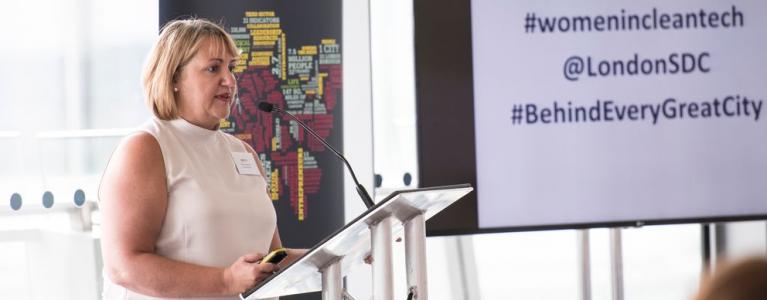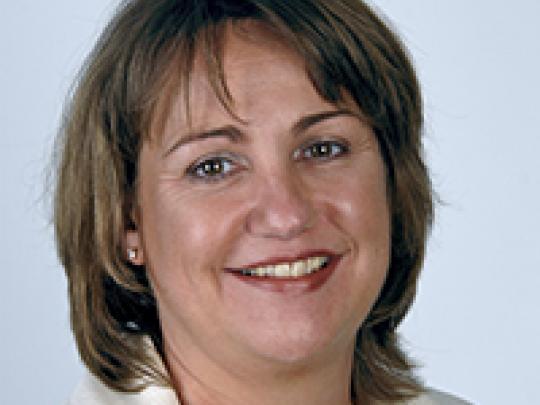
By Karen Lawrence, Commissioner on the London Sustainable Development Commission
I have the privilege of leading an exciting project for the London Sustainable Development Commission (LSDC) that’s all about getting more women into and leading the city’s cleantech industry. This is the sector that produces the technologies, goods and services that reduce negative impacts on our environment, and it’s an important and growing part of London’s economy.
The LSDC’s Women in Cleantech project is taking place at an auspicious time. Throughout 2018, to mark the centenary of the first women winning the right to vote in the UK, the Mayor of London’s #BehindEveryGreatCity campaign is celebrating the city’s role in the women’s suffrage movement. This will mark the progress that’s been made for and by women over the past 100 years, and take real action to tackle gender inequality in London. As part of this, I had the great privilege to attend the unveiling of the statue of suffragist Millicent Fawcett earlier this year – the first statue of a woman by a woman in Parliament Square. The Mayor is also rolling out Better Futures, a project designed to give 100 small cleantech businesses the boost they need to be successful, and create a hub for low-carbon industries in London.
Over the last couple of months, we’ve surveyed and met with some great women contributors from the field during our research and workshops. This has given us some fantastic insight into what prevents women entering the cleantech sector and/or staying there to realise their true potential. On Wednesday 13 June, we hosted a solutions workshop in City Hall to look at these issues in more detail, and start working on what we’ll do about them, so the cleantech sector can benefit from what these amazing women have to offer.
We’re grateful to Shirley Rodrigues (Deputy Mayor for Environment and Energy) for setting out London’s ambitions for the sector and how this project can help inform them. We’re also grateful to Juliet Davenport (CEO & Founder, Good Energy), Dr. Hayaatun Sillem (CEO, Royal Academy of Engineering) and Louise Wilson (CEO, Abundance Investment), who kicked us off with some personal insights into their experiences in the sector.
There was consensus that students are made to choose too early in their lives between the sciences and the arts – a complete contradiction to working life where businesses need communicators who understand science, and scientists or mathematicians with effective communication skills. We learned that we can all do more by sharing our own career stories, such as in schools or via social media. And we learned the importance of male role models who treat women as equals in the workplace; these can be just as important as female ones.
As we passed the microphone to over 60 talented and enthusiastic women (and some equally talented men as well), the energy in the room was electric! Many issues raised were not unique to the cleantech sector: unconscious gender bias, ‘imposter syndrome’ and relatively low female participation in STEM subjects all emerged. But some sector-specific topics were also raised. This included a sense that the cleantech sector was one in which it was possible to have a social purpose and deliver global impact in equal measure – something that was likely to attract women into the industry and so should be promoted.
But this project isn’t about initiating ‘special measures’ for women because we’re needy! Indeed, studies show that businesses with women at strategic and senior management levels generally outperform businesses with no, or fewer, women in these positions. This is about a basic understanding that to build the best of anything you need a wide range of tools in your toolbox. It reminds me of the old proverb “If all you have is a hammer, everything looks like a nail”. To be the best leader, male or female, you need to be able to get the best out of everyone in your team. Time to put more of those leadership tools, personal and institutional, into the cleantech toolbox!
Our next step is to use what we’ve heard to facilitate discussions with the cleantech community about which support programmes we think should be developed or strengthened to help more women enter this sector. Watch out for our report which will be published on our website later this year.
We’re keen to hear what individuals and organisations making up the cleantech ecosystem can do to help increase the number of women entering and leading the cleantech sector. If you’re interested in knowing more or in getting involved, please contact us.
About the author

Karen Lawrence has spent the past 30 years in several diverse sectors and a mixture of blue chip and SME organisations. Working for the Energy Saving Trust for over 10 years provided Karen with a robust platform of broader sustainability knowledge and specifically on working with communities on sustainability. This was further strengthened in a role as a trustee and latterly Vice Chair of Pure Leapfrog. For the LSDC, Karen is currently leading on a key project to identify and address barriers to inclusivity in the cleantech sector.